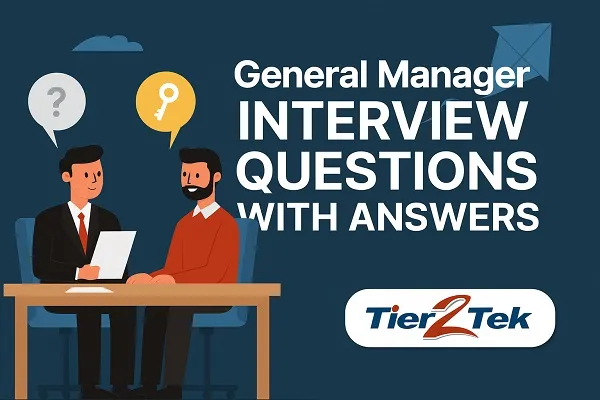General Manager Interview Questions with Answers

A General Manager (GM) is responsible for overseeing daily operations, implementing business strategies, and driving organizational success. During a GM interview, candidates are often asked technical questions that assess their ability to manage budgets, lead teams, analyze performance, and optimize processes. Below are 15 key technical questions with short, effective answers that candidates can use to prepare confidently.
1. How do you develop and manage an annual budget?
I start by reviewing past performance, collaborating with department heads, forecasting revenues/expenses, and adjusting allocations based on strategic goals.
2. What KPIs do you track regularly as a General Manager?
Revenue growth, profit margins, customer retention, employee turnover, and operational efficiency are my key focus areas.
3. How do you analyze financial statements?
I review the income statement, balance sheet, and cash flow statement to assess profitability, liquidity, and financial health.
4. Describe your approach to strategic planning.
I conduct SWOT analysis, set measurable objectives, align resources, and monitor progress through quarterly reviews.
5. How do you handle underperforming departments?
I assess root causes, provide coaching or resources, set clear performance goals, and track improvements.
6. What experience do you have with ERP systems?
I’ve implemented and managed ERP platforms like SAP and Oracle to streamline operations and integrate business functions.
7. How do you ensure compliance with industry regulations?
I stay updated on regulations, implement standard operating procedures, and conduct regular internal audits.
8. What’s your method for managing supply chain operations?
I focus on demand planning, vendor management, and inventory control to reduce costs and avoid disruptions.
9. How do you evaluate operational efficiency?
I use lean metrics, time studies, and process audits to identify bottlenecks and implement continuous improvement.
10. What financial ratios do you consider most important?
I focus on gross margin, operating margin, return on assets (ROA), and current ratio for overall performance insight.
11. Describe a time you led a digital transformation.
I led a CRM integration that automated workflows, improved customer tracking, and increased sales team productivity.
12. How do you manage risk in business operations?
By identifying potential risks, evaluating impact, creating mitigation plans, and maintaining insurance where applicable.
13. What’s your approach to inventory management?
I use just-in-time (JIT) systems and real-time tracking to balance stock levels and reduce waste.
14. How do you allocate resources across departments?
Based on strategic priorities, performance data, and ROI forecasts, while maintaining cross-functional balance.
15. What role does data analytics play in your decision-making?
Data helps me identify trends, forecast performance, and make evidence-based decisions to optimize business outcomes.
🔍 Common Acronyms to Know Before a General Manager Interview
Understanding industry acronyms is crucial for effective communication in a General Manager role. Here are some you should know:
1. KPI – Key Performance Indicator
A measurable value that shows how effectively a company is achieving key business objectives.
2. ROI – Return on Investment
A metric used to evaluate the efficiency or profitability of an investment.
3. ERP – Enterprise Resource Planning
A software system that integrates core business processes, including finance, HR, and supply chain.
4. CRM – Customer Relationship Management
A system used to manage a company’s interactions with current and potential customers.
5. EBITDA – Earnings Before Interest, Taxes, Depreciation, and Amortization
An indicator of a company’s financial performance and profitability.
6. P&L – Profit and Loss Statement
A financial report summarizing revenues, costs, and expenses during a specific period.
7. JIT – Just-In-Time
An inventory strategy that aligns raw-material orders with production schedules to reduce waste.
8. SWOT – Strengths, Weaknesses, Opportunities, Threats
A strategic planning framework used to evaluate a company’s competitive position.
9. ROA – Return on Assets
A financial ratio indicating how profitable a company is relative to its total assets.
10. COGS – Cost of Goods Sold
The direct costs attributable to the production of the goods sold by a company.
